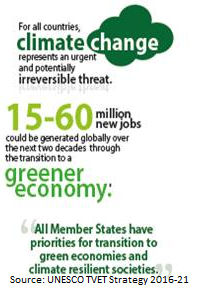
The UNESCO-UNEVOC International Centre: Who We Are | What We Do | Working With Us | Get in Touch
The UNEVOC Network: Learn About the Network | UNEVOC Network Directory
For Members: UNEVOC Centre Dashboard
Thematic Areas: Inclusion and Youth | Digital Transformation | Private Sector Engagement | SDGs and Greening TVET
Our Key Programmes & Projects: BILT: Bridging Innovation and Learning in TVET | Building TVET resilience | TVET Leadership Programme | WYSD: World Youth Skills Day
Past Activities: COVID-19 response | i-hubs project | TVET Global Forums | Virtual Conferences | YEM Knowledge Portal
Our Services & Resources: Publications | TVET Forum | TVET Country Profiles | TVETipedia Glossary | Innovative and Promising Practices | Toolkits for TVET Providers | Entrepreneurial Learning Guide
Events: Major TVET Events | UNEVOC Network News
From the 27th-28th March, the Partnership for Action on Green Economy (PAGE) Ministerial Conference![]() was hosted in Berlin by the Government of the Federal Republic of Germany in collaboration with the PAGE Partners. The conference was attended by Ministers, Deputy Ministers and other government officials from over 30 countries, to discuss “Inclusive and Sustainable Economies: Powering the SDGs”. UNESCO-UNEVOC collaborated with PAGE founding partners; UNIDO
was hosted in Berlin by the Government of the Federal Republic of Germany in collaboration with the PAGE Partners. The conference was attended by Ministers, Deputy Ministers and other government officials from over 30 countries, to discuss “Inclusive and Sustainable Economies: Powering the SDGs”. UNESCO-UNEVOC collaborated with PAGE founding partners; UNIDO![]() , UNDP
, UNDP![]() , UN Environment
, UN Environment![]() , ILO
, ILO![]() and UNITAR
and UNITAR![]() to highlight the catalysing role of education and training to supply requisite skills in shaping green economy, at this conference.
to highlight the catalysing role of education and training to supply requisite skills in shaping green economy, at this conference.
Dr. Shyamal Majumdar, Head of UNESCO-UNEVOC delivered a keynote address on the multi-level investments that can be done through education and training by citing the adverse implications of skills gaps in the context of green jobs. Extoling the implications of greening economies on the growing demand for matching skills profiles in existing and new occupations, he highlighted the imminent and widening shortages of skilled labor supply if the education and training response did not adopt accordingly.
This skills shortage could stall green economy expansion, consistent with reports and projections that have been done to tackle this issue. He suggested that the right adaptation strategies need to be developed to address both the unknown and obvious skills gaps, while also highlighting the need for countries to have a right balance of policy, financial and technical inputs to fast-track education and training response. These responses must stem from building the capacities of institutions and training providers, national policy coherence and collaboration among global players, private sector, civil society and communities.
L to R: Mr. Tommy Nederman - Scandic Hotels Germany, Mr. Kartikeya Sarabhai, Centre for Environment Education India, Hon. Ibrahim U. Jibril - Hon. Minister of State for Environment Nigeria, Prof. Heila Lotz-Sisitka - Rhodes University South Africa, Dr. Shyamal Majumdar - Head of UNESCO-UNEVOC, Ms. Cristina Martinez - ILO .
As highlighted in the UNESCO TVET Strategy (2016-2021)![]() , all Member States have priorities for the transition to green economies and climate resilient societies. Such transitions will positively affect employment and transform consumption and production patterns.
, all Member States have priorities for the transition to green economies and climate resilient societies. Such transitions will positively affect employment and transform consumption and production patterns.
 The transformation to a greener economy could generate 15 to 60 million additional jobs globally over the next two decades and lift tens of millions of workers out of poverty.
The transformation to a greener economy could generate 15 to 60 million additional jobs globally over the next two decades and lift tens of millions of workers out of poverty.
This conference also provided an opportunity for Yaba College of Technology, a UNEVOC Centre in Nigeria and one of the pioneer centres in UNEVOC’s Greening TVET thematic engagements, to share their experiences. John Okewole, from the Yaba College of Technology, pitched a project that can meet the skills demand in the waste management value chain. He proposed an approach based on YTC’s ongoing efforts to engage the youth in projects that promote entrepreneurship and derive new products and services out of wastes. The need for teacher and student mentoring programmes was highlighted as an imperative to scale up these initiatives and create a greater impact for the communities and the learning process.
The conference was attended by the Ministers and government officials from Barbados, Ghana, Senegal, Burkina Faso, Nigeria, South Africa, Republic of Korea, Germany, Finland, Norway, Sweden, Switzerland, Costa Rica, amongst others.
For more information:
1. Partnership for Action on Green Economy![]()
2. UNESCO-UNEVOC Greening TVET